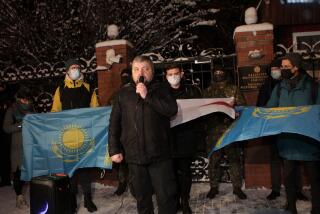BOOK REVIEW / HISTORY : As Yeltsin Sees It--Including Revisions : THE STRUGGLE FOR RUSSIA; By<i> Boris Yeltsin, translated by Catherine A. Fitzpatrick</i> (Times Books: $25, 316 pages)
- Share via
Now that Solzhenitsyn has renounced literature in favor of politics, is there room in the Russian literary pantheon for politician-turned-author Boris Yeltsin?
*
Uh, no.
Yeltsin’s second and latest book, “The Struggle for Russia,” is a political memoir fashioned out of excerpts from a journal that he apparently managed to keep during a tumultuous three-year period that included the failed coup of August, 1991; the final disintegration of the Soviet Union; the shoot-out at the Russian parliament, and miscellaneous other crises.
“Whether people like it or not,” the first elected president of Russia muses out loud, “they must figure out who this Yeltsin is--what kind of person is he, what does he think, where is he taking us?”
While Yeltsin’s book is, at moments, a worthy account of contemporary Russian politics from an insider’s point of view, Yeltsin neither aspires to nor achieves much intimacy in his reflections or much grandeur in his prose. Rather, he presents himself as a hard-working politician who is really a just-plain-Ivan kind of guy.
Now and then, Yeltsin allows us to glimpse the more private facets of his life: “I suffer from insomnia,” he explains, and he confesses to stage fright: “When I have to go on TV, I sweat bullets.”
Yeltsin is far more interested in explaining (or justifying) himself in the eyes of history. He often refers to himself in the third person as “Yeltsin” or, more often, “the president.” And he invariably styles himself as a democratic activist--his attack on Mikhail Gorbachev in the last days of the Soviet Union, for example, is explained as a matter of principle, not politics.
“Unlike most democrats, I surmised that the threat of dictatorship came not only from ‘Gorby’s’ entourage but also from Gorbachev himself,” Yeltsin declares. “And that was truly terrible.”
Only rarely does Yeltsin give us a truly startling insight into his own political destiny, as when he ponders the yellowing papers in a secret police file on the arrest of his father during the worst years of the Stalinist terror: “I was only three years old at the time of my father’s arrest,” he recalls, “but I remember to this day all the horror and fear.”
More often, Yeltsin contents himself with dishing the inside story on Kremlin politics in the final days of the Soviet Union and the stormiest moments of its tumultuous aftermath.
Yeltsin also rises to his own defense in explaining his trepidation in the days leading up to the assault on the White House. Condemning the insurrectionists as “neo-Nazis, bandits and outright fascists,” he insists that he acted courageously and decisively to crush the threat to the infant Russian democracy.
The publisher is candid enough to advise us that “in a few places, Yeltsin himself has exercised the author’s prerogative to amend his observations and place them in perspective.” In other words, Yeltsin has rewritten his journal entries so that they support his claim to a place in world history.
“Something amazing happened,” he writes about the collapse of communism. “Overnight, a new Russia--’Boris Yeltsin’s Russia’--took the place of the Soviet Union in international politics.”
We do not yet know whether Yeltsin, like Gorbachev, will end up on the dust heap of history. But, in the meantime, Yeltsin is hoping that readers in Russia and America, too, are still interested in knowing he thinks of himself and his curious fate as “the first freely chosen president of Russia.”
More to Read
Sign up for our Book Club newsletter
Get the latest news, events and more from the Los Angeles Times Book Club, and help us get L.A. reading and talking.
You may occasionally receive promotional content from the Los Angeles Times.







